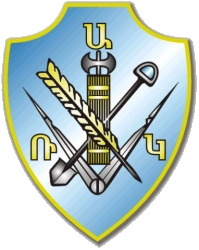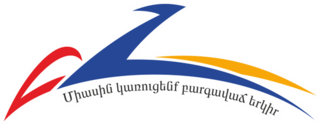
The politics of Armenia take place in the framework of the parliamentary representative democratic republic of Armenia, whereby the President of Armenia is the head of state and the Prime Minister of Armenia the head of government, and of a multi-party system. Executive power is exercised by the President and the Government. Legislative power is vested in both the Government and Parliament.

The Armenian Revolutionary Federation (ARF), also known as Dashnaktsutyun, is an Armenian nationalist and socialist political party founded in 1890 in Tiflis, Russian Empire by Christapor Mikaelian, Stepan Zorian, and Simon Zavarian. Today the party operates in Armenia, Artsakh and in countries where the Armenian diaspora is present. Nowadays it constitutes a minor party, and as of December 2018 was represented in two national parliaments with 7 seats in the National Assembly of Artsakh and three seats in the Parliament of Lebanon as part of the March 8 alliance.

Orinats Yerkir, is a political party operating in Armenia since its foundation in 1998 by Artur Baghdasaryan, who is leading the party up to now. In the 2007 Armenian parliamentary elections, it obtained 9 seats in parliament, in contrast to 19 seats in the 2003 elections. It has not had a presence in the National Assembly since 2017 after failing to win any seats. The party's name is translated into English in a number of ways, including Country of Law and Rule of Law.

Elections in Armenia gives information on election and election results in Armenia. Armenia has a multi-party system. After latest constitutional reform only a legislature is elected on national level.

The Armenian Democratic Liberal Party, the Ramgavar Party,, also known by its Armenian initials or its English initials ADL is an Armenian political party in the Armenian diaspora including the Middle East, Europe, the Americas and Australia.
The People's Party of Armenia is a left-wing socialist political party in Armenia. At the last elections, 25 May 2003, the party won 1.1% of popular votes and no seats. Its Presidential Candidate, Stepan Demirchyan, won 27.4% of the popular vote in the first voting round. In the 2007 Armenian parliamentary elections it did not win any seat with a popular vote of 1.68%.

Parliamentary elections were held in Armenia on 12 May 2007. 1,364 candidates ran for the 131 seats, 41 of which were constituency seats with the remaining 90 being filled by a proportional party-list system. The electoral threshold is five per cent.

Prosperous Armenia Party, is a political party in Armenia. It was founded by businessman Gagik Tsarukyan on 30 April 2004, when the constituent congress of the party took place.

The Armenian Revolutionary Federation, also known simply as Tashnag, is an Armenian political party active in Lebanon since the 1920s as an official political party in the country after having started with small student cells in the late 1890s and early 20th century.
The Armenian National Congress is a political party in Armenia, led by former President Levon Ter-Petrosyan and formed in 2008. Its direct predecessor was the Pan-Armenian National Movement.

The United Liberal National Party, also known by its Armenian initials, is a political party in Yerevan, Armenia established in 2007. MIAK advocates the ideology of national liberalism. Co-founder Levon Martirosyan, elected MP from RPA in 2012.

Parliamentary elections were held in Armenia on 5 July 1995, with a second round on 29 July. There were 150 constituency seats and 40 elected on a national basis using proportional representation. The result was a victory for the Republican Bloc, which won 88 of the 190 seats. Overall voter turnout was 54.3%.

Parliamentary elections were held in Armenia on 30 May 1999. There were 75 constituency seats and 56 elected on a national basis using proportional representation. The result was a victory for the Unity Bloc, which won 62 of the 131 seats. Overall voter turnout was 51.7%.

A parliamentary election was held on May 6, 2012 in Armenia.
Voting to elect eight members of the Lebanese parliament took place in the Beirut I district on March 24, 1968, part of the national general election of that year. The constituency had 98,439 eligible voters, out of whom 28,631 voted. The elections in Beirut I passed smoothly without violent incidents.

Parliamentary elections were held in Armenia on 2 April 2017. They were the first elections after a constitutional referendum in 2015 that approved reforms for the country to become a parliamentary republic. The result was a victory for the ruling Republican Party of Armenia, which won 58 of the 105 seats in the National Assembly.

Bright Armenia is a liberal political party founded on December 12, 2015.

The Way Out Alliance or Yelk Alliance or simply Yelk or Way Out was a liberal political alliance of three political parties in Armenia: Civil Contract, Bright Armenia and the Hanrapetutyun Party party. It was formed on 12 December 2016, before the 2017 Armenian parliamentary election. Its leaders were Edmon Marukyan, Nikol Pashinyan and Aram Sargsyan. It was dissolved on 12 September 2018 after its constituent parties agreed to participate in the 2018 parliamentary elections separately.

Snap parliamentary elections were held in Armenia on 9 December 2018, as none of the parties in the National Assembly were able to put forward and then elect a candidate for Prime Minister in the two-week period following the resignation of incumbent Prime Minister Nikol Pashinyan on 16 October. They were the first elections after the 2018 revolution and the country's first-ever snap elections.










